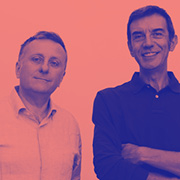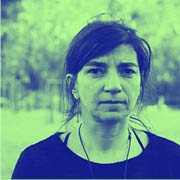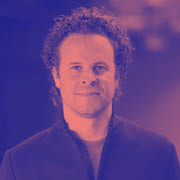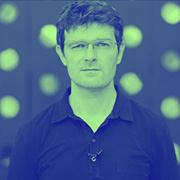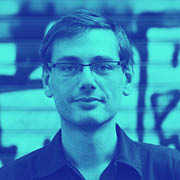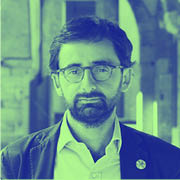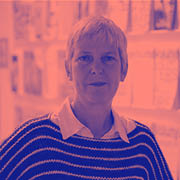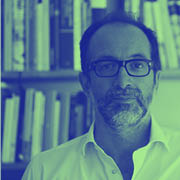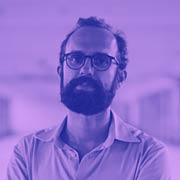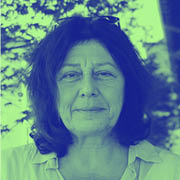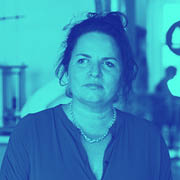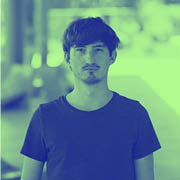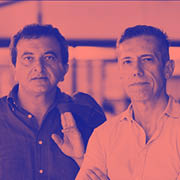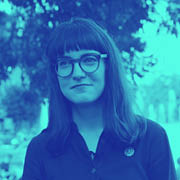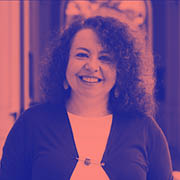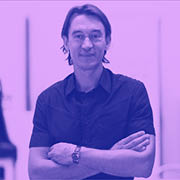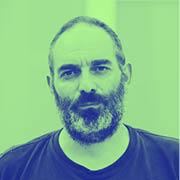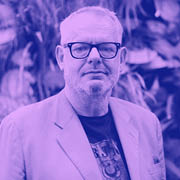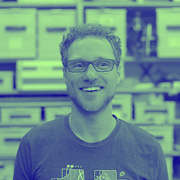DIRECTOR CHEFARE
BERTRAM NIESSEN
Bertram Niessen, PhD, is a researcher and teacher. He works at the crossroad between grassroots practices, cultural innovation and social activism. He is the scientific director of the cultural transformation agency cheFare.
TERMS
factishes
conflicts
politics of algorithms
dictatorship of collaborations
NEW ECOLOGIES
FACTISHES
Factishe is a term introduced by Bruno Latour in his reflections on actor-network theory. The ‘factish’ is both a cultural and natural construct that refers to all the products of technology that, despite being produced by man, are referred to as if they were natural. When they enter our daily lives, we accept them as if they always existed, as if their ontology was independent from human beings. Following this line of thought, everything is a ‘factish’, because every human effort to substantiate knowledge about reality actually produces hybrids that are not natural, but rather products of culture. Thinking about the built environment, and the city in particular, as a net of ‘factishes’, could help us develop complex instruments to overcome dichotomies, such as the one of nature and culture, that seem useless in the contemporary age.
URBAN ASSETS
CONFLICTS
In the last decade, paradoxically, conflictual elements have disappeared from the debate about urban governance, especially with regards to the relation between politics, development policies and real estate. Access to media in our daily life confronts us with talk about many conflicts that are coming increasingly closer and on completely different scales. Conflict is one of the most important parts of urban experience. One of the big problems of the neoliberal governance of cities is that it has eliminated elements of conflict and replaced them with processes of construction of urban meaning. This banishment forces conflict to come back only in its most extreme manifestations. The reintegration of conflict, in a constructive and generative way, in systems of governance and planning development, is the only possible way to reimagine the city.
DIGITAL TOOLKIT
POLITICS OF ALGORITHMS
This is not a technical tool but a set of conceptual tools. We definitely need a broader, interdisciplinary approach, because algorithms nowadays regulate a huge amount of our lives. This occurs not only from the point of view of control in the sense of privacy, mobility or technological aspects, but also concerning the possibility to build a sense of reality. Take for example the filter bubble, a banal but also one of the most interesting phenomena. In order to counter the algorithmic filters that social networks and search engines create for our access to information about the world, we would need to develop the conceptual and practical tools that will allow us to manipulate these filters. Such tools would completely change our possibilities of access to reality in a more conscious and complex way.
NEW COLLECTIVES
DICTATORSHIP OF COLLABORATIONS
The last 10 years have brought an important transformation in forms of collaboration. This change has been encouraged through new technological platforms that provide previously unthinkable possibilities, as well as new forms of politics, both in terms of political action and of political reflection that increasingly permeate our daily lives. Being part of new collectives that affect completely different aspects of our daily life requires a growing amount of time. This time is neither compensated for, nor appreciated within traditional systems. As a consequence, having a ‘full’ civic life implies being part of uninterrupted processes of collaboration and decision-making. On the one hand this is fantastic because it opens up the boundaries of ‘civicness’ in interesting ways. On the other hand it also requires an extraordinary effort. Reflecting on the meaning of this, dictatorship of collaborations is fundamental for me.
INTERVIEWED BY
GIANPIERO VENTURINI
Bertram Niessen discusses the difficulties in agreeing on common definitions when the meanings of words become increasingly complex and reflects on old and new vocabularies as instruments of power.
blog
BERTRAM NIESSEN
Personal blog
link
MEDIASPREE
Article by Natalia Sosin
‘Media Spree’ on Berlin’s river: swim next to offices
Cafébabel
GV:
Can you elaborate on the concept of conflict and refer to a specific case?
BN:
An interesting case of management, or lack of management, of conflicts at an urban level, is in the case of Mediaspree in Berlin, along the Spree riverbank between the neighbourhoods of Friedrichshain and Kreuzberg. It has already been a very long and complex process, lasting over 15 years. The local public administration brought in big real estate developers, mainly in the media and creative sectors, to develop the Spree riverbank in opposition to the inhabitants of the two neighbourhoods. Both these neighbourhoods were traditionally two of the most politically active and alternative areas of Berlin. What I find worth noting is that the citizen movement did not succeed in stopping the real estate regeneration process; there was also a referendum that was then ignored. However from a social point of view, the generative element of conflicts contributed to the creation of a very strong sense of community. For over 15 years, the urban governance of the territory was much more complex and layered than we thought before. There was not a polarisation between the city on one side and developers on the other, but several groups of interests from citizens and stakeholders to different development groups, each with very different set of interests. Through their conflict, they actually produced the territory that we see now, and this is definitely an urban conflict that can teach us a lot.
GV:
This project is about creating a New Vocabulary of Terms, what do you think defines contemporary vocabulary and is there something that should change about it?
BN:
We are living in complex times, and by complex I mean times that witness completely different readings that overlap and are layered. We ourselves are subjects that experience this complexity. A vocabulary may be a banal concept, but in this context of complexity, we are constantly faced with new readings, points of access and new perspectives, and we remain stuck in this multiplicity. There is a strong need to develop a new vocabulary but that does not necessarily mean new terms. It can also mean new manuals of use for existing terms, that would enable us to read their complexity and act upon them. There are several practical developments that suggest what a new vocabulary could be, because we live in a world in which new vocabularies are produced continuously: maps, readings, atlases and glossaries are all constructive elements of our cultural life, as well daily lives, that are not used to their full potential. It is fundamental to find systems of sharing, debate and collaboration, on a social level, that enable these vocabularies to generate meaning. It really is a matter of constructing meaning; starting from a reflection on existing terms, words and practices, to go beyond them and create a relationship between all these elements in a more complex overview. Then we would be able to construct meaning for political action in a broad sense.
It really is a matter of constructing meaning; starting from a reflection on existing terms, words and practices, to go beyond them and create a relationship between all these elements in a more complex overview.
GV:
Do you recall any positive or negative experiences you had with vocabulary in communication between disciplines - a moment when a word from a different discipline inspired you or when you discovered you were misunderstood because of lack of common understanding of terms used by specific disciplines?
BN:
In the last 20 years, I spent a lot of time working with people that had diverse cultural and professional backgrounds and I would say that the misunderstanding of terms has been at the core of my job in these last two decades. Particularly in the last 10 years, I have been mediating and facilitating communication between people of different backgrounds so it is difficult to chose just one example. Perhaps, the one that impressed me the most, and still does, is the term postmodern. In my experience and education as a sociologist, postmodern had to do with the end of great narratives. Inevitably the definition had something negative to it, in the sense that there was no strong statement on the existing. However, when I discussed the definition of postmodernism with architects and designers, they were looking at it in a positive way. Drawing on Learning from Las Vegas, they had an attitude that, in its most simplistic manifestation, would be something like: ‘Finally! We can have fun as we always wanted to but no one allowed us before!’ I see the same reaction in different fields of philosophy; the notion of postmodern is highly valued and is regarded positively, because the focus moves towards relativism where there is the possibility to validate very different opinions. The same term is not interpreted in different ways but the reading of it is slightly different. If a sociologist, a philosopher and an architect sit at the same table to discuss a topic, they could easily debate for an hour without understanding each other.
book
LEARNING FROM LAS VEGAS
By Robert Venturi, Denise Scott Brown and Steven Izenour
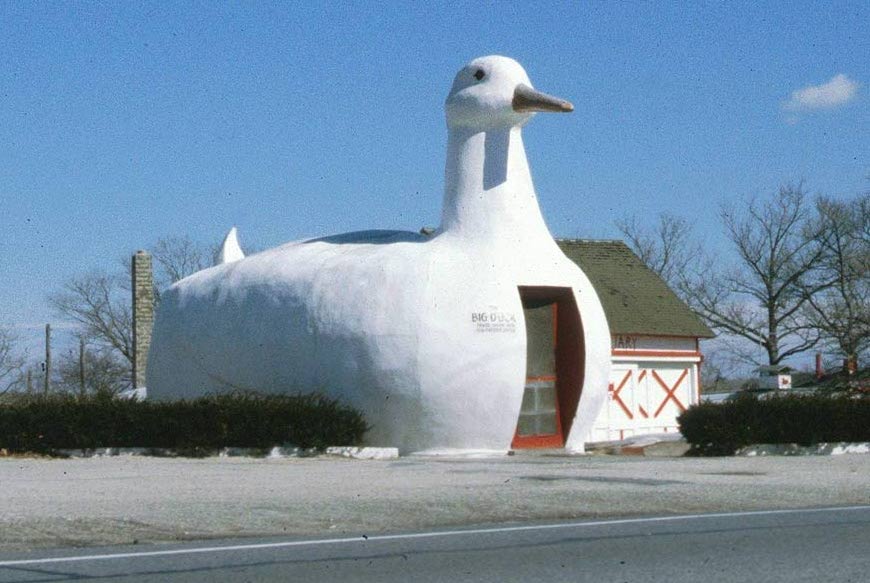

article
DAILYMAIL
‘Europe's cabbies decry competition from Uber app'
GV:
Regarding the new vocabulary of terms: who might find this vocabulary useful? Why?
BN:
The main target group interested in a vocabulary is university students. Maybe this is based on my own professional experience, but I believe that those who currently study experience this ‘telluric landslide’, where the old ways of understanding things collide with new worlds that are approaching. Students stand on this fault line. The older generations already confront issues with an approach typical of the 20th century, so whilst it is fundamental for us to reflect on our vocabulary because we often lack the linguistic and semantic tools to face the problem, it is young people that need this reflection most urgently.
There are many interesting examples, in particular if we look at the emergence of the sharing economy. Some years ago I conducted an interesting experiment with my students. We took the case of rising conflict between taxi drivers and Uber drivers and created a debate in the classroom between a ‘pro’ and an ‘against’ group. Many interesting things emerged, because this is clearly something that cannot be discussed within traditional political categories. Here in Milan there was a huge conflict three years ago, during which the trade union of taxi drivers opposed the public administration in very violent ways. With demonstrations, smoke bombs and fights, in order to protest the liberalization of Uber. This conflict had a strong echo in the city. It may be something that happened in many other European cities but in Italy, and Milan in particular, liberalisations have always been a strong political topic of debate. I believe that in a case like this, developing new terms, which means developing new concepts and new conceptual tools that allow us to read this complexity, is a key aspect.
There is a strong need to develop a new vocabulary but that does not necessarily mean new terms. It can also mean new manuals of use for existing terms, that would enable us to read their complexity and act upon them.
link
CHEFARE
Each year cheFare awards prizes for innovative projects across Italy
che-fare.com
link
DOPPOIZERO
doppiozero.com
GV:
CheFare is bringing to light some interesting initiatives at national scale. Together with other interesting initiatives, such as IC or Culturability, it is drawing a potential map of new relations. How would you define this potential?
BN:
CheFare originated from an award for projects of cultural innovation within the agenda of the cultural association called Doppiozero. It was established in 2012, awarding a prize of 100.000 euros. What we were looking for was basically new forms of cultural organization in the broadest sense, so cooperatives, associations, informal collectives, start-ups, foundations, any kind of organization trying to implement radically new ways of production, creation and distribution of culture. CheFare in its third edition as an award, ended a few months ago; in the past 4 years we received more than 1800 projects and we awarded 5 prizes for a total of 350.000 euros. Most importantly, we became an independent organization, that for 2 years now has created challenges, awards and competitions to directly fund projects that we find interesting in addition to networking and advocating for the new topics that deal with culture. Basically, our work is the constant mapping and travelling through Italy to meet the people who are creating new forms of cultural entrepreneurship. These range from fab-labs, to squats looking for legitimacy to enter the system, to cultural centres and other kinds of initiatives. The experience of CheFare is the constant work of the construction and deconstruction of terms in the effort to understand how the initiatives that we map came about, how they survive and what they could become. At the same time we are also trying to understand what are the keywords, the praxis, the concepts and debates that they arise from, how these terms are used in different fields and different ways. For this, it is crucial to work in a variety of environments, in order to create a dialogue between cultural entrepreneurships and social movements.
Vocabularies are dangerous, in the sense that any vocabulary when used becomes an instrument of power. Aside from the necessity to build meaning around new terms, in a world increasingly difficult to comprehend, one of the reasons why new vocabularies are booming in recent years is the attempt to create new forms of power.
GV:
There is a strong relationship between the vocabulary and those to whom it is addressed. Those using new words and expressions to define new concepts, for instance, like new professions and experts. What is the relation between the new vocabulary and these new disciplines?
BN:
Vocabularies are dangerous, in the sense that any vocabulary when used becomes an instrument of power. Aside from the necessity to build meaning around new terms, in a world increasingly difficult to comprehend, one of the reasons why new vocabularies are booming in recent years is the attempt to create new forms of power. This is not necessarily a negative fact. An interesting phenomenon that we witness in recent years is, what I provocatively call, the conflict for the creation of linguistic marketing. It is clearly seen in the academic realm, where the pressure for academic publications forces researchers and academics to connect their name to an emerging term in order to be prominently cited. In the realm of public debate, spanning the media from newspapers to social networks, there is something very similar. So eventually, the construction of vocabularies means recognition, because it establishes new terms in the common sense.
